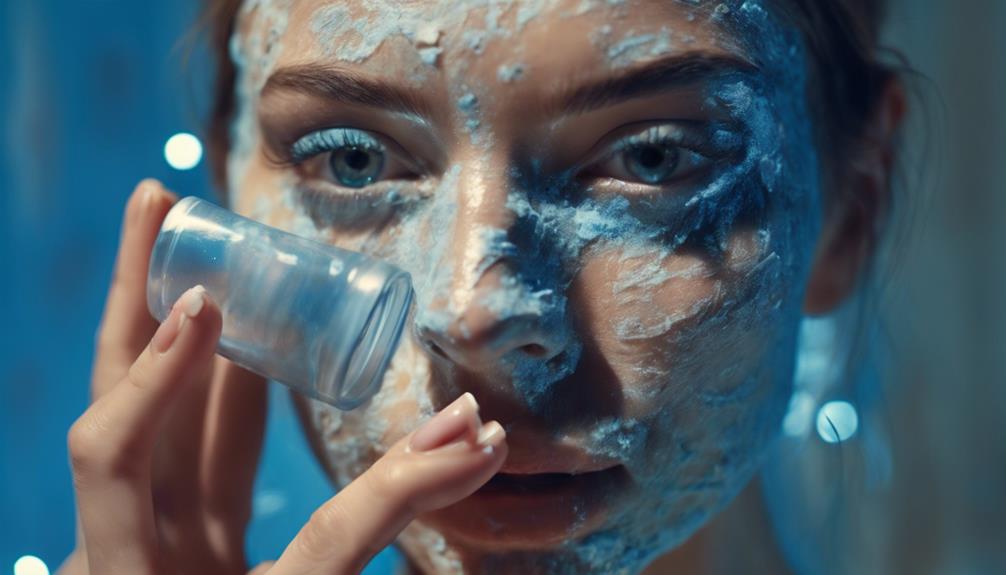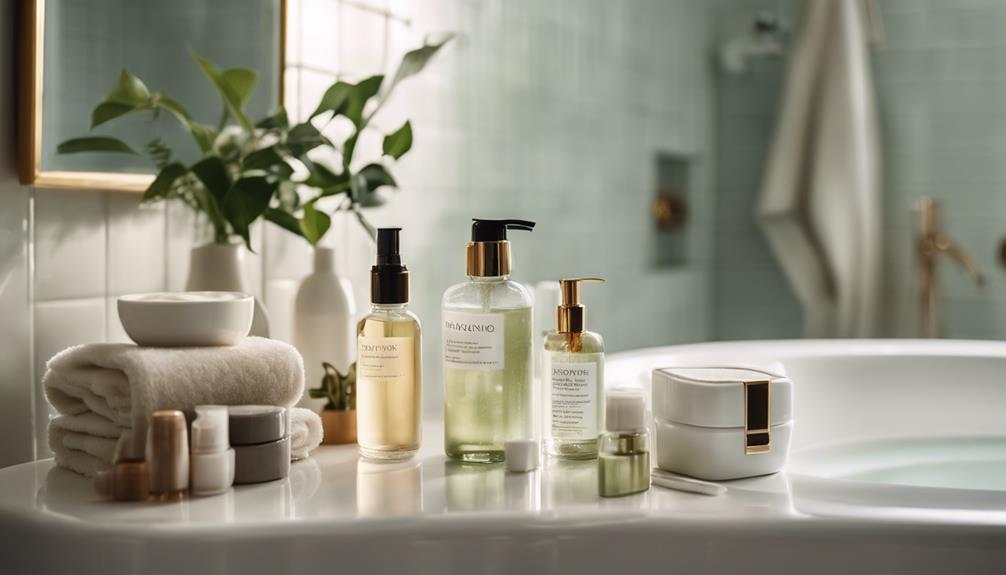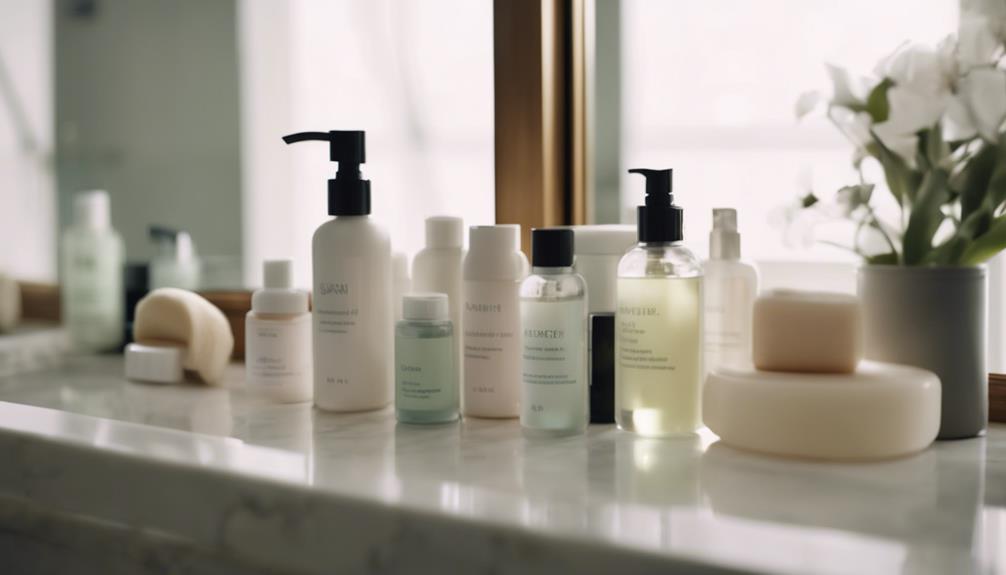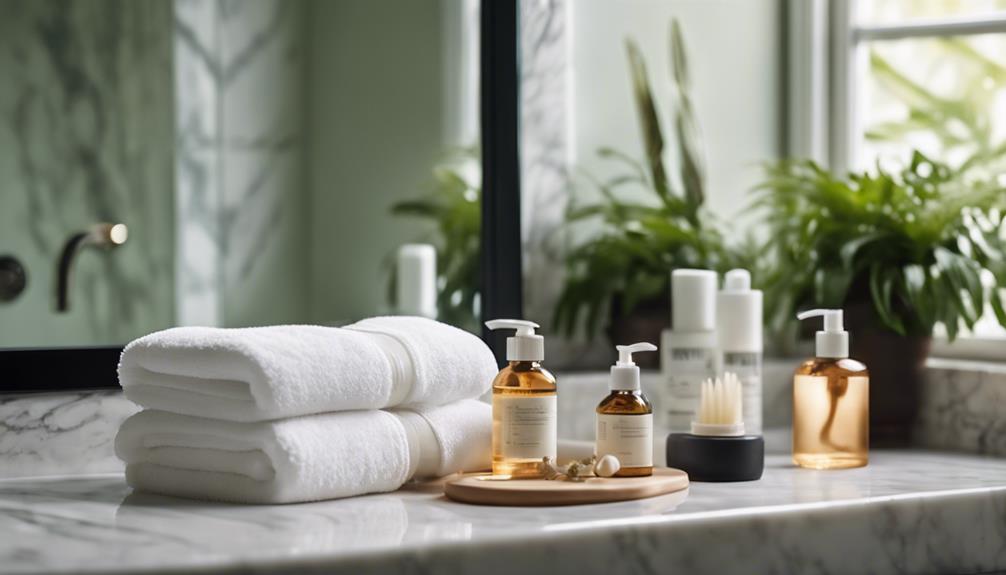You might not realize it, but your daily habits could be damaging your skin. Inadequate nighttime cleansing can lead to breakouts, while sleeping in makeup clogs your pores. Neglecting sunscreen exposes you to harmful UV rays, accelerating skin aging. Smoking greatly harms your skin's appearance and elasticity. Poor dietary choices, like high sugar intake, can trigger inflammation. Additionally, popping pimples worsens conditions, and excessive caffeine can lead to dehydration. Skipping meals disrupts your skin's natural repair. Each of these habits takes a toll, but there's so much more to uncover about your skincare routine.
Key Takeaways
- Neglecting nightly cleansing leads to clogged pores, increasing the risk of breakouts and skin irritation.
- Skipping sunscreen exposes skin to harmful UV rays, accelerating aging and increasing the risk of skin cancer.
- Poor dietary habits, like high sugar intake, can damage collagen, leading to premature aging and skin issues.
- Overusing harsh acne treatments can irritate skin, making conditions worse instead of improving them.
Inadequate Nighttime Cleansing
Inadequate nighttime cleansing can lead to a buildup of dirt and oil on your skin, increasing the risk of breakouts and irritation. When you skip this vital step, you allow pollutants and makeup to linger, which can clog pores and create the perfect breeding ground for bacterial infections. Your skin needs to breathe and recover while you sleep; without proper cleansing, it can't do that effectively.
Using a gentle cleanser with ingredients like glycerin or botanical oils helps remove impurities without stripping your skin of its natural moisture. This is essential for maintaining a balanced complexion. If you're in a hurry or too tired for a full routine, facial wipes can be a practical alternative, but they shouldn't replace a thorough wash.
Incorporating consistent nighttime cleansing into your routine not only prevents clogged pores but also supports your skin's natural repair process. By committing to this simple habit, you can greatly reduce the chances of acne outbreaks and other skin issues. Remember, your skin deserves better, so make nighttime cleansing a priority.
Smoking and Skin Damage

Smoking wreaks havoc on your skin, accelerating aging and dulling your complexion. Each decade you smoke can add about 2.5 years to your skin's appearance. The nicotine in cigarettes constricts blood vessels, reducing blood flow and depriving your skin of essential oxygen and nutrients. This leads to a lifeless, dull complexion.
Additionally, smoking damages collagen and elastin fibers, crucial components for maintaining skin's firmness and elasticity. Smokers often suffer from uneven skin tone and texture, with deep wrinkles around the mouth and eyes due to repetitive facial movements.
Here's a quick overview of how smoking affects your skin:
| Effect | Description |
|---|---|
| Skin Aging | Accelerates aging, adding years to your appearance. |
| Dull Complexion | Reduced blood flow leads to lifeless skin. |
| Uneven Skin Tone | Higher likelihood of uneven tone and rough texture. |
| Deep Wrinkles | Prominent around the mouth and eyes from facial movements. |
| Collagen & Elastin Damage | Depletes essential fibers, reducing skin elasticity. |
Quitting smoking can greatly improve your skin's health, leading to a more youthful appearance in just a few months.
Neglecting Sunscreen Application

Neglecting to apply sunscreen can leave your skin vulnerable to harmful UV damage, increasing your risk of skin cancer and premature aging.
It's vital to make daily sunscreen application a non-negotiable part of your routine, even on cloudy days.
UV Damage Risks
Skipping sunscreen can expose your skin to harmful UV rays, increasing the risk of skin cancer and speeding up the aging process. Even on cloudy days, up to 80% of UV radiation can penetrate through clouds, making it essential to apply sun protection daily. Neglecting this vital step can lead to serious consequences, including:
- Increased risk of skin cancer
- Formation of fine lines and wrinkles
- Development of sunspots and hyperpigmentation
Regularly applying broad-spectrum sunscreen with at least SPF 30 can greatly reduce UV damage, helping you maintain youthful skin. Studies show consistent SPF application can decrease skin aging by up to 24%, allowing you to enjoy the outdoors without compromising your skin's health.
Remember, sunscreen isn't just for beach days—it's a year-round necessity. By incorporating this simple habit into your daily routine, you can protect yourself from the sun's harmful effects and keep your skin looking its best for years to come.
Don't underestimate the power of sun protection; your skin will thank you now and in the future.
Daily Application Importance
Consistent sunscreen application every day is key to protecting your skin from the damaging effects of UV rays, which can lead to premature aging and increased cancer risk. Without this daily application, you're setting yourself up for significant skin damage, including wrinkles and dark spots. Even if it's cloudy, UV rays can still penetrate your skin, making it essential to apply sunscreen with at least SPF 30.
Here's a quick reference table to help you understand the importance of daily sunscreen application:
| Factor | Impact | Recommendation |
|---|---|---|
| UV Rays Exposure | Causes skin damage and aging | Apply broad-spectrum sunscreen |
| Skin Condition | Leads to wrinkles, dark spots, etc. | Use SPF 30 or higher |
| Reapplication Frequency | Maintains protection | Reapply every 2 hours |
| Long-term Benefits | Preserves youthful appearance | Make it a daily habit |
Incorporating sunscreen into your daily routine not only protects you from immediate sunburn but also plays a significant role in long-term skin health. Don't overlook this critical step in your skincare regimen; your skin will thank you!
Broad-Spectrum Protection Necessity
Failing to apply broad-spectrum sunscreen puts your skin at risk of damage from harmful UVA and UVB rays. These rays can lead to premature aging and even skin cancer, making it vital to incorporate sunscreen into your daily routine.
Remember, UV rays aren't just a summer problem; they can penetrate window glass and cause skin damage even indoors or on cloudy days.
To guarantee your skin stays protected, consider these tips:
- Choose a broad-spectrum sunscreen with at least SPF 30.
- Reapply every two hours if you're outdoors, especially during prolonged exposure.
- Don't skip sunscreen on cloudy days—up to 80% of UV rays can reach your skin.
Neglecting this vital step can result in visible consequences like wrinkles, fine lines, and uneven skin tone, which may be irreversible without professional treatment.
Prioritize broad-spectrum protection daily to keep your skin looking youthful and healthy. Your future self will thank you!
Poor Dietary Habits

What you eat plays an essential role in your skin's health, as poor dietary habits can lead to premature aging and various skin issues. High sugar intake is particularly damaging, accelerating skin aging by harming collagen and elastin, resulting in brittleness and loss of elasticity.
Additionally, consuming processed foods and refined carbohydrates can trigger inflammation, contributing to skin conditions like acne and dullness.
To combat these effects, focus on your nutrient intake. A diet rich in fruits and vegetables provides essential antioxidants that support skin repair and overall health, helping mitigate the signs of aging. On the other hand, insufficient intake of vitamins C, E, and A can lead to dryness and a lack of skin energy.
Remember, regular meals are important for nourishing your skin.
Hydration also plays an important role in skin health. If you're not drinking enough water, your skin may become rough and shrunken, exacerbating those unwanted aging signs.
By making conscious dietary choices, you can greatly improve your skin's appearance and resilience, ensuring it stays vibrant and youthful.
Prioritize your diet, and your skin will thank you!
Harsh Acne Treatments

When you're battling acne, it's easy to think that stronger is better, but that's not always the case.
Using high concentrations of active ingredients can irritate your skin and do more harm than good.
Instead, sticking to effective yet gentler treatments can help you achieve clearer skin without the discomfort.
Effective Treatment Concentrations
Finding the right concentration in acne treatments is essential, as lower doses of ingredients like benzoyl peroxide and salicylic acid can effectively clear skin with less irritation.
When dealing with sensitive skin, it's important to start with lower concentrations to see how your skin reacts before moving to stronger formulations.
Here are some effective treatment concentrations to take into account:
- Benzoyl Peroxide: Effective at 2.5% concentration, it minimizes irritation while fighting acne.
- Salicylic Acid: Works best between 0.5% and 2% to unclog pores and reduce inflammation.
- Higher Concentrations: More isn't always better; they can lead to increased irritation rather than enhanced results.
Avoiding Skin Irritation
Overusing harsh acne treatments can lead to significant skin irritation, making it essential to approach your skincare routine with care. If you have sensitive skin, opting for gentler options is vital. Products like benzoyl peroxide and salicylic acid can be effective, but higher concentrations often cause more harm than good.
Research shows that a 2.5% benzoyl peroxide solution works just as well as stronger doses without causing excessive irritation. It's important to apply these treatments sparingly. Overapplication can compromise your skin barrier, leading to increased redness, dryness, and even more breakouts.
Instead, prioritize gentle, non-comedogenic products that won't clog your pores or worsen your skin's condition. Before introducing new acne treatments, don't skip patch testing on a small area. This simple step can help prevent severe allergic reactions or irritation from affecting your entire face.
Overexposure to Chlorine

Swimming in chlorinated pools can seriously damage your skin by stripping away its natural oils and causing dryness and irritation. Over time, continuous exposure to chlorine can weaken your skin barrier, making your skin more susceptible to conditions like eczema and dermatitis.
To protect your skin while enjoying the pool, consider these tips:
- Rinse off immediately: Always shower with fresh water right after swimming to wash away chlorine.
- Use extra sudsy soap: A more potent body wash can effectively remove chlorine residues that a regular wash might miss.
- Apply a moisturizing lotion: Before diving in, slather on a moisturizing lotion to create a protective barrier against chlorine.
Sleeping in Makeup

Sleeping in makeup is a risky habit that can put your skin at serious risk.
It clogs your pores, making acne outbreaks more likely, and creates a perfect environment for bacterial infections.
If you want to keep your skin healthy and radiant, removing your makeup before bed is a must.
Bacterial Infections Risk
Leaving makeup on overnight exposes your skin to harmful bacteria that thrive in the trapped dirt and oils, increasing the risk of infections. When you skip that nightly cleanse, you're not just risking clogged pores; you're inviting potential bacterial infections that can wreak havoc on your skin health.
Here are some key reasons to ditch the makeup before bed:
- Bacterial Growth: Leftover makeup creates a breeding ground for bacteria, leading to infections.
- Skin Irritation: Trapped dirt and oils can cause inflammation and irritation, making your skin more sensitive.
- Pillowcase Contamination: Bacteria from your makeup can transfer to your pillowcase, perpetuating the cycle of breakouts.
To maintain ideal skin health, it's essential to establish a thorough cleansing routine before bed. By doing so, you'll help prevent the accumulation of makeup and bacteria that can compromise your skin.
Prioritizing this simple habit can lead to clearer, healthier skin and greatly reduce your risk of bacterial infections.
Clogged Pores Consequence
Failing to remove makeup before bed not only heightens the risk of bacterial infections but also leads to clogged pores, setting the stage for unwanted acne outbreaks. When you sleep in makeup, it traps pollutants, dirt, and bacteria against your skin, disrupting its natural repair processes. This can irritate your skin and even exacerbate conditions like eczema and rosacea.
To keep your skin healthy, washing your face nightly is vital. Here's a quick comparison of methods to effectively remove makeup:
| Method | Pros |
|---|---|
| Makeup Removers | Gentle on the skin, effective |
| Cleansing Wipes | Convenient for quick use |
| Oil Cleansers | Breaks down heavy makeup |
Incorporating a nightly routine with the right makeup removers guarantees your skin can breathe and recover overnight. Clogged pores from residual makeup can lead to blackheads and whiteheads, making it imperative to cleanse your face thoroughly. Prioritize your skin's health by adopting this simple habit and enjoy a clearer, healthier complexion!
Excessive Caffeine Consumption

Excessive caffeine consumption can greatly damage your skin by causing dehydration and diminishing its natural glow. When you consume too much caffeine, it acts as a diuretic, promoting increased urine output. This leads to dry, dull skin, which can affect your skin's elasticity and contribute to premature aging.
Consider these effects of high caffeine intake:
- Dehydration can result in fine lines and wrinkles.
- Insufficient sleep from caffeine can cause dull skin and dark circles.
- Increased stress hormone levels can trigger acne flare-ups.
Balancing your caffeine intake with plenty of water throughout the day can help maintain moisture in your skin. Remember, hydration is key to preserving its natural beauty.
By being mindful of how much caffeine you consume, you can support your skin's health and well-being. Making small adjustments now can lead to significant improvements in your skin's appearance over time.
Popping Pimples

Popping pimples might seem tempting, but it can actually worsen your skin's condition and lead to more breakouts. When you pop a pimple, you risk pushing dirt and bacteria deeper into your skin, which can increase inflammation and prolong the life of that blemish. Instead of finding relief, you might end up with more severe acne.
Additionally, squeezing can double the healing time of acne lesions and often results in scarring. That means not only do you deal with the original breakout, but you also face the potential for lasting marks on your skin. The trauma from popping can trigger more acne in the surrounding area, exacerbating the problem.
To protect your skin, it's best to avoid touching your face and refrain from popping pimples. If you're desperate for results, consider visiting a dermatologist for professional extraction. They can safely remove blemishes, reducing the risk of infection and scarring.
Skipping Meals

Skipping meals can seriously damage your skin's health by depriving it of essential nutrients needed for hydration and elasticity. When you neglect regular meals, you risk developing nutrient deficiencies that can accelerate skin aging and lead to dryness. Your skin relies on a steady supply of vitamins C, B3, E, and A to maintain its glow and resilience.
Here are a few reasons why meal skipping is harmful:
- It compromises your skin's elasticity and hydration, resulting in a dull complexion.
- A balanced diet provides essential antioxidants from fruits and vegetables, countering the effects of aging.
- Inconsistent eating habits can disrupt your skin's natural repair processes.
To enhance your skin health, prioritize regular meals packed with vitamins and nutrients. This way, you'll not only look better but also feel more vibrant.
Remember, your skin reflects what you put into your body. By nourishing it with the right foods, you can combat aging and maintain a youthful appearance.
Don't let skipping meals become a habit that harms your skin!
Frequently Asked Questions
What Are the Habits of Skin Damage?
You might not realize it, but neglecting proper cleansing, smoking, skipping sunscreen, making poor dietary choices, and sleeping with makeup on can all harm your skin. These habits can lead to premature aging and breakouts.
What Is the Most Damaging Thing to Skin?
The most damaging thing to your skin is neglecting protection against UV rays. Whether it's sunny or cloudy, unprotected exposure leads to premature aging, dark spots, and a heightened risk of skin cancer you can't ignore.
What Habit Is Not Healthy for the Skin?
Neglecting hydration is like a parched desert to your skin. When you don't drink enough water, your skin loses its glow, becoming dull and lifeless. Keep sipping to keep that youthful radiance alive!
What Is the Most Harmful Habit?
The most harmful habit you can have is neglecting your health. Whether it's poor diet, lack of exercise, or inadequate sleep, these choices can greatly impact your overall well-being and quality of life.
How Can Spring Cleaning for Your Skin Help Prevent Damage From Bad Habits?
Spring cleaning for your skin is essential to prevent damage from bad habits. Implementing detox tips for skin can help remove built-up toxins, unclog pores, and improve overall skin health. By incorporating a regular skincare detox routine, you can prevent long-term damage and maintain healthy, glowing skin.
Conclusion
Incorporating healthy habits into your daily routine can transform your skin for the better.
Remember, “an ounce of prevention is worth a pound of cure.”
By addressing these damaging habits—like inadequate cleansing and neglecting sunscreen—you'll not only enhance your skin's appearance but also promote its long-term health.
Make small changes today, and watch your skin thrive.
After all, a little care goes a long way in achieving that radiant glow you desire!









